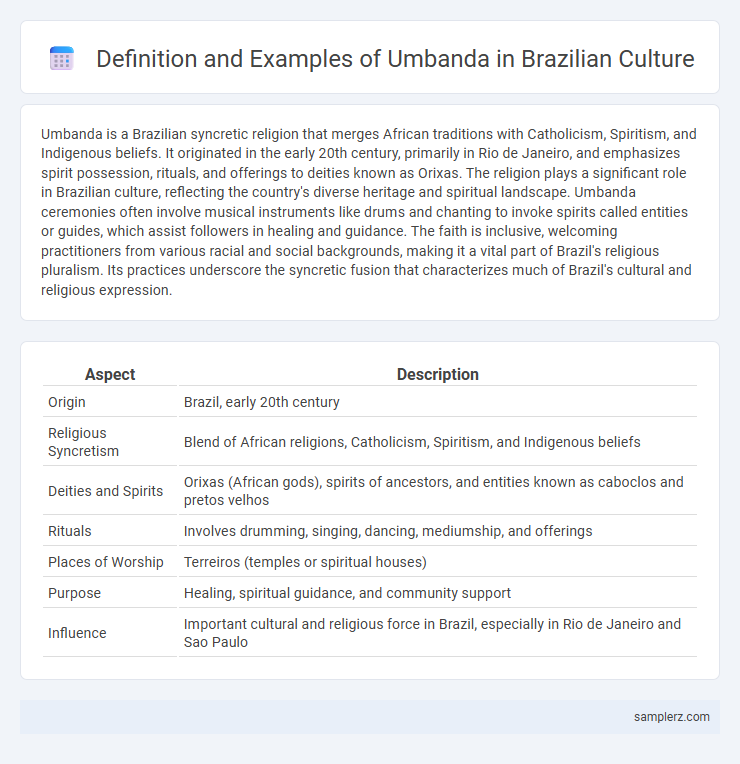Umbanda is a Brazilian syncretic religion that merges African traditions with Catholicism, Spiritism, and Indigenous beliefs. It originated in the early 20th century, primarily in Rio de Janeiro, and emphasizes spirit possession, rituals, and offerings to deities known as Orixas. The religion plays a significant role in Brazilian culture, reflecting the country's diverse heritage and spiritual landscape. Umbanda ceremonies often involve musical instruments like drums and chanting to invoke spirits called entities or guides, which assist followers in healing and guidance. The faith is inclusive, welcoming practitioners from various racial and social backgrounds, making it a vital part of Brazil's religious pluralism. Its practices underscore the syncretic fusion that characterizes much of Brazil's cultural and religious expression.
Table of Comparison
| Aspect | Description |
|---|---|
| Origin | Brazil, early 20th century |
| Religious Syncretism | Blend of African religions, Catholicism, Spiritism, and Indigenous beliefs |
| Deities and Spirits | Orixas (African gods), spirits of ancestors, and entities known as caboclos and pretos velhos |
| Rituals | Involves drumming, singing, dancing, mediumship, and offerings |
| Places of Worship | Terreiros (temples or spiritual houses) |
| Purpose | Healing, spiritual guidance, and community support |
| Influence | Important cultural and religious force in Brazil, especially in Rio de Janeiro and Sao Paulo |
Origins and History of Umbanda in Brazil
Umbanda originated in Brazil during the early 20th century, merging African, Indigenous, and Catholic religious traditions into a unique syncretic faith. Its roots trace back to Rio de Janeiro in the 1900s, incorporating elements from Spiritism, Yoruba religions, and European mysticism. Umbanda developed as a response to social and spiritual needs of Afro-Brazilian communities seeking inclusion and cultural identity.
Core Beliefs and Practices of Umbanda
Umbanda in Brazil centers on syncretism, blending African, Indigenous, and Catholic traditions with Spiritism, emphasizing the worship of orixas, spirits, and ancestors. Core beliefs include reverence for nature, spiritual healing, and the guidance of mediums who communicate with spirits for advice and assistance. Rituals feature singing, drumming, offerings, and trance states, aiming to promote harmony, protection, and community well-being.
Syncretism: Blending African, Indigenous, and Catholic Traditions
Umbanda in Brazil exemplifies religious syncretism by seamlessly blending African spiritual practices, Indigenous beliefs, and Catholic elements into a cohesive faith. This Afro-Brazilian religion incorporates orixas from Yoruba traditions, Indigenous spirits, and Catholic saints, creating a unique worship system that reflects Brazil's cultural diversity. Rituals often involve drumming, singing, and offerings, symbolizing the harmonious fusion of these distinct but interconnected religious identities.
The Role of Spirit Entities in Umbanda Rituals
Spirit entities in Umbanda rituals in Brazil serve as vital intermediaries between the physical and spiritual worlds, guiding practitioners through healing, advice, and protection. These entities, often embodying orixas, caboclos, and pretos-velhos, influence the ritual's structure by facilitating communication and spiritual balance. Their presence shapes the cultural and religious significance of Umbanda, emphasizing syncretism and Afro-Brazilian heritage.
Umbanda Temples: Structure and Community
Umbanda temples in Brazil typically feature a hierarchical structure led by a pai de santo, who guides rituals and community activities. These temples serve as cultural hubs, promoting Afro-Brazilian religious practices that blend indigenous, African, and Catholic traditions. Community members gather regularly for ceremonies involving music, dance, and spirit possession, reinforcing social bonds and cultural identity.
Popular Umbanda Rituals and Ceremonies
Popular Umbanda rituals in Brazil often include the "Passe," a spiritual energy cleansing performed by mediums to heal participants and ward off negative influences. The "Gira" ceremony, a central ritual in Umbanda, involves drumming, singing, and spirit possession, creating a dynamic atmosphere for communication with orishas and ancestor spirits. Offerings such as flowers, candles, and food are essential during these ceremonies, symbolizing respect and devotion to deities and guiding spirits within Umbanda practice.
The Role of Music and Dance in Umbanda Worship
Umbanda worship in Brazil integrates vibrant music and dance as essential expressions of spiritual connection and community cohesion. Rituals feature drums, chants, and rhythmic movements that invoke orixas, facilitating trance states and divine communication. These performative elements reflect Afro-Brazilian heritage, blending indigenous, African, and Catholic influences within the religious practice.
Umbanda’s Influence on Brazilian Art and Culture
Umbanda, a syncretic Afro-Brazilian religion, profoundly shapes Brazilian art and culture through its rich symbolism, vibrant rituals, and spiritual themes. Its influence is evident in diverse artistic expressions such as music, dance, visual arts, and literature, where elements like orixas, sacred chants, and ritualistic imagery inspire creativity and cultural identity. The integration of Umbanda's spiritual practices fosters community cohesion and preserves ancestral heritage, reinforcing its enduring impact on Brazil's cultural landscape.
Controversies and Misconceptions About Umbanda
Umbanda, a syncretic Brazilian religion blending African, Indigenous, and Catholic elements, faces controversies rooted in misunderstandings about its rituals and spirit communication practices. Critics often mislabel Umbanda as witchcraft or superstition, ignoring its role in promoting social inclusion and cultural identity among Afro-Brazilian communities. Media portrayals sometimes reinforce stereotypes, contributing to prejudice and hindering broader acceptance of Umbanda's spiritual and cultural contributions.
Contemporary Umbanda: Challenges and Revival in Modern Brazil
Contemporary Umbanda in Brazil faces challenges such as social stigmatization and competition with evangelical movements, yet it experiences a cultural revival through urban youth engagement and digital platforms. The syncretic religion's rituals, blending African, Indigenous, and Catholic elements, foster a resilient identity amid increasing secularization. Efforts to preserve Umbanda's heritage emphasize education and interfaith dialogue, reinforcing its role in Brazil's diverse cultural landscape.

example of "umbanda" in "Brazil Infographic
 samplerz.com
samplerz.com